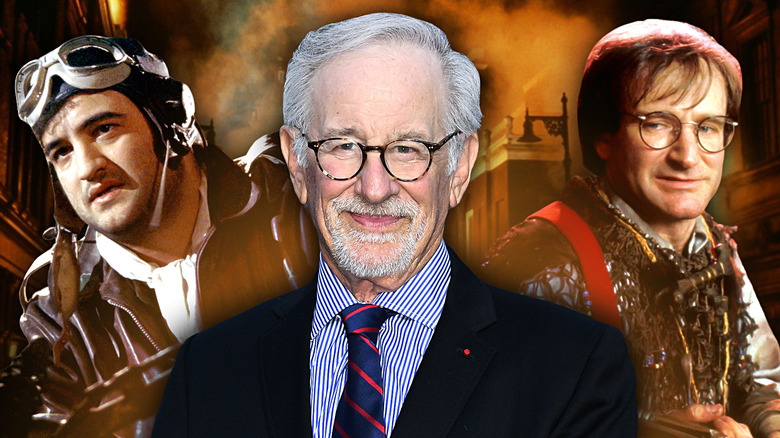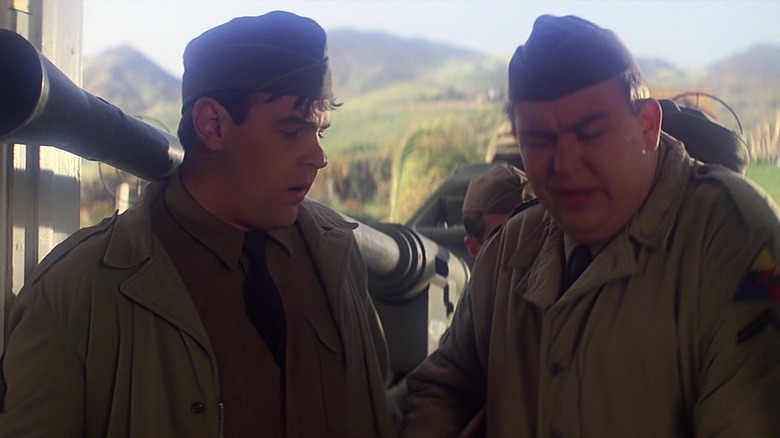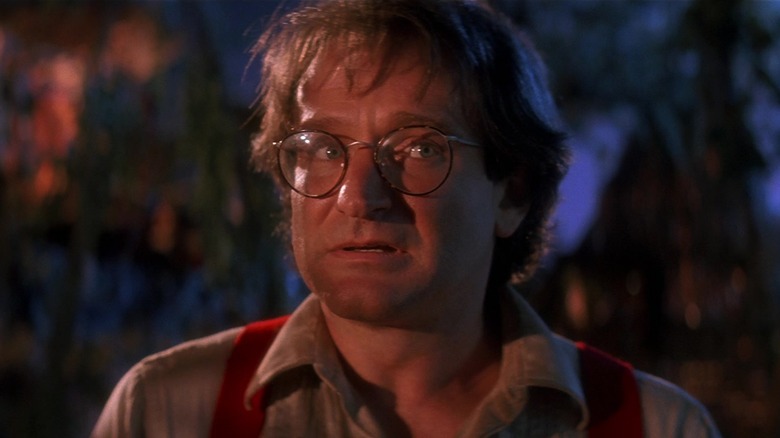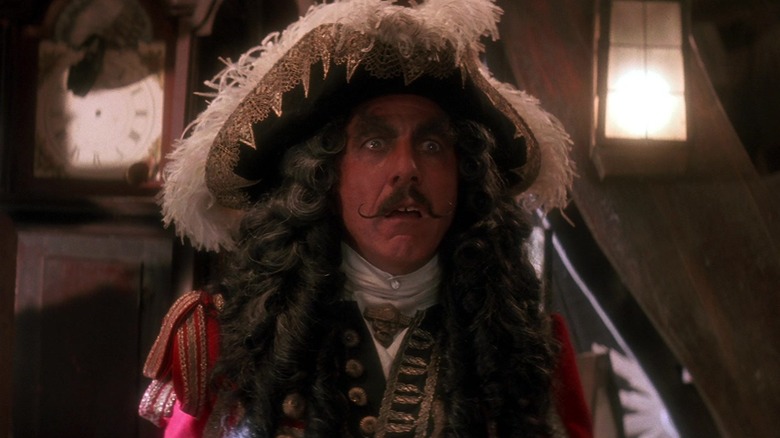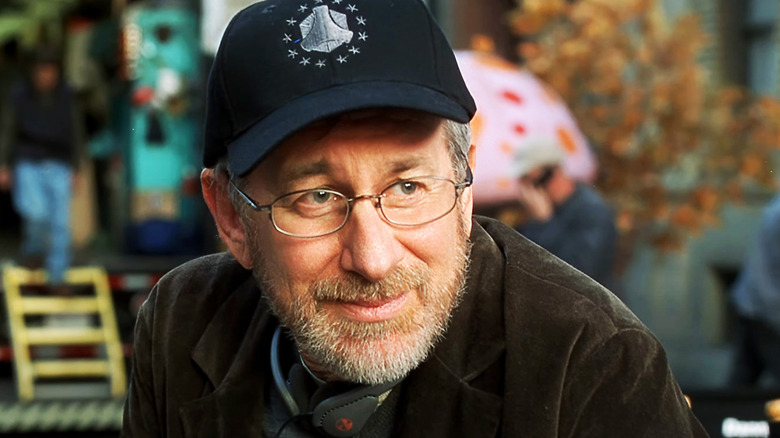Steven Spielberg's Two Worst Movies According To Rotten Tomatoes
For a good while, it seemed as though everything Steven Spielberg touched turned to gold. Having established the very concept of the blockbuster with "Jaws" in 1975, the director went on to make hit after hit with "Close Encounters of the Third Kind" (1977), "Raiders of the Lost Ark" (1981), and "E.T. the Extra-Terrestrial" (1982). Even 1984's "Indiana Jones and the Temple of Doom" was a box office success, despite shocking some viewers who weren't used to such a dark and oddly violent effort from the director. Critical response to the movie was also more mixed than it had been for its predecessor. Of course, anyone following Spielberg's career closely would have known that "Temple of Doom" was not the first time the seemingly infallible director had fallen afoul of the critics.
Sandwiched between "Close Encounters" and "Raiders" in Spielberg's filmography is "1941." Made in 1979, this war comedy featured an ensemble cast that included Dan Aykroyd, Ned Beatty, John Belushi, John Candy, and Christopher Lee. Unfortunately, the impressive talent on-hand couldn't save Spielberg's foray into comedy from failing to wow critics — even while the film made three times its production budget with a $94 million worldwide box office take.
Now, 45 years after its debut, "1941" has become one of Spielberg's lowest-rated films on Rotten Tomatoes — a fact which surely won't worry the directing legend too much. But while this was an early blip on an otherwise stellar record, "1941" wouldn't be the last time critics took Spielberg to task — as evidenced by Rotten Tomatoes' ranking of the filmmaker's oeuvre.
Steven Spielberg's 1941 didn't fare too well on Rotten Tomatoes
"1941" has a bit of a strange premise. The movie tries to mine American post-Pearl Harbor fear for comedy, which perhaps unsurprisingly resulted in a less than impressive RT score. As it stands, "1941" has a 39% rating on Rotten Tomatoes, but there are several things to say here.
Firstly, the RT score for "1941" is based on just 28 reviews, of which only three come from "top critics." What's more, of those three, two actually liked the movie, with Ian Freer of Empire even writing that the film is "blessed with the buzz of brilliance." Indeed, if you take a look at the average rating for "1941" — Rotten Tomatoes' representation of the actual grades given to films by critics — "1941" holds a more respectable 5 out of ten.
Still, there's no getting around the fact that "1941" was not exactly a critical hit, even with its top comedic cast and the writing talents of Robert Zemeckis and Bob Gale involved. In his negative review for the New York Times, Vincent Canby described "1941" as "less comic than cumbersome," and "as much fun as a 40-pound wrist-watch."
That said, the second major point here is that 39% is not actually all that bad a rating relative to some of the other lowest scores we've seen in Rotten Tomatoes' ranking of directors and actors' work. If you're John Travolta, with his seven 0%-rated movies, for example, you'd probably be pretty impressed by a career that, at its worst, yielded a 39% Tomatometer score. Even the great Ridley Scott's filmography includes a regrettable 26-percenter. Unfortunately, 39% is actually not the lowest score Spielberg has ever seen from Rotten Tomatoes.
Hook should have been a Steven Spielberg classic
After "Indiana Jones and the Temple of Doom," audiences weren't entirely sure that the Steven Spielberg they'd come to know still existed. Previously, his films revolved around a celebration of childhood wonder, but "Temple of Doom" with its literal violence against children, seemed to mark a turning point in the director's creative approach. But much of the darkness in "Temple of Doom" came from George Lucas' script, with Spielberg himself later saying, "I wasn't happy with 'Temple of Doom' at all. It was too dark [...] There's not an ounce of my personal feeling in 'Temple of Doom.'"
Still, there's no denying the films that followed were much bleaker affairs than "E.T." or "Raiders." "The Color Purple" and "Empire of the Sun" were undeniable departures for the director, who had welcomed his first son in 1985 — the same year he abandoned his long-gestating passion project, a live-action Peter Pan adaptation, and had seemingly taken the role of dad seriously enough that his perspective became much more mature.
By the late-'80s, however, Spielberg was ready to finally bring his Peter Pan adaptation to fruition. 1989's "Indiana Jones and the Last Crusade" had been somewhat of a return to the director's more family-friendly approach, but "Always," released later that same year, seemed to be another a step backward. 1991's "Hook," as the adaptation was eventually titled, was therefore set to be his real triumph — a true passion project that once again tapped into Spielberg's fascination with, and reverence for childhood. The director identified with the character of Jack in the original story, whose rocky relationship with his father somewhat mirrored Spielberg's own. In that sense, much like with "E.T.," "Hook" seemed to have all the makings of a Spielberg classic. Sadly, the film is now the director's lowest-rated movie on Rotten Tomatoes.
Steven Spielberg's lowest-rated film on Rotten Tomatoes
At the time of writing, "Hook" has a 29% rating on Rotten Tomatoes. Unlike with "1941," of the 65 reviews collected on the site, a full 18 of them are from "top critics," who evidently weren't too impressed with Steven Spielberg's sequel to J. M. Barrie's 1911 "Peter Pan" novel.
In the film, Robin Williams played an older version of the boy who wouldn't grow up in the form of Peter Banning — a middle-aged lawyer who is consumed by his work and has forgotten his childhood. When Dustin Hoffman's Captain Hook captures his children, Peter is forced to return to Neverland and rediscovers his childhood in the process. Not a bad idea, really — especially as it serves as a nice little allegory for the way in which becoming an adult often detaches us all from our sense of innocence. Unfortunately, despite turning a modest profit at the box office, the film didn't prove to be the Spielbergian classic many had hoped.
Critics were not very kind to "Hook," as evidenced by its standing as the lowest-rated Spielberg movie on Rotten Tomatoes. In a particularly biting review, Kenneth Turan of the Los Angeles Times wrote, "It has clearly gotten harder for this director to break free of the lure of material things and believe in simple magic." In his two-star review, Roger Ebert was similarly pessimistic, calling the film a "lugubrious retread of a once-magical idea" and writing, "The sad thing about the screenplay for 'Hook' is that it's so correctly titled: This whole construction is really nothing more than a hook on which to hang a new version of the Peter Pan story."
Is Hook really that bad?
It might not come as that big a surprise that "Hook" is Steven Spielberg's lowest-rated film on Rotten Tomatoes. Even Spielberg himself didn't have much faith in "Hook" while he was filming it, claiming not to have confidence in the bulk of the script. But as previously mentioned, Spielberg's worst movie was always going to be a heck of a lot better than the worst movie of pretty much everyone else in Hollywood, and 29% is not great, but it definitely isn't as bad as it could be. It's also worth noting that the film's actual average rating on Rotten Tomatoes is 4.5 out of ten — again, a slight step up from the 29% rating.
Years after it was released, however, Spielberg remains as penitent, telling Entertainment Weekly in 2011:
"There are parts of Hook I love. I'm really proud of my work right up through Peter being hauled off in the parachute out the window, heading for Neverland. I'm a little less proud of the Neverland sequences because I'm uncomfortable with that highly stylized world that today, of course, I would probably have done with live-action character work inside a completely digital set."
Still, at least Spielberg can rest easy in the knowledge "Hook" inspired the director of the upcoming "Wicked" movie, and I'm sure the film's RT score is the least of the filmmaker's concerns when it comes to his well-intentioned but ill-fated Peter Pan sequel.
